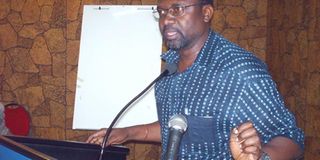Prof Oloka-Onyango talks on ‘ghosts’ and the law

Prof Joe Oloka-Onyango speaks at an event recently. He delivered his inaugural lecture at a fully-packed Makerere University Main Hall in Kampala on Thursday evening. FILE PHOTO
What you need to know:
10-year wait. Inaugural lecturers are usually delivered at the start of a professor’s career, but Prof Joe Oloka-Onyango has instead delivered close to the end of his profession, with only five years to his retirement. The inaugural dwelled on scenarios in which court declined to hear cases because they fall under the “political question doctrine” and can’t order government to act on the aggrieved matters, writes Anthony Wesaka.
A fully packed audience assembled at Makerere University Main Hall on Thursday evening rose to applaud Prof Joe Oloka-Onyango’s moving inaugural lecture, “Ghosts and the Law.”
The law professor began by apologising for delivering his inaugural lecture 10 years late, though he reserved his reasons for doing so.
“I am delivering my inaugural lecture 10 years after becoming professor of law at a point closer to the end of my tenure than the beginning. The reasons for the delay are enough to fill another lecture, hence I will spare the reader the tedious explanations and move on to thank those who both inspired me into the academy and sustained me while there,” said Prof Oloka-Onyango.
On a sad note, Prof Oloka-Onyango wished his father, Bernard Onyango, a renown Makerere University academic registrar who died in October 2013, was part of the occasion to witness his son give his inaugural lecture.
Prof Oloka-Onyango, who was clad in an academic gown, revealed to the audience that his father had always encouraged him to deliver his inaugural lecture.
Ghosts and the law
As he began his talk, Prof Oloka-Onyango told the audience that there are ghosts everywhere, including in the holy books: the Bible and Quran. In the Bible, he cited the portion of scripture that talks of a man who was full of demons that were later cast into pigs that drowned.
Core to Prof Oloka-Onyango’s 30-year legal academic career is the puzzle of the ghost called the ex parte Matovu, whose name in full is Uganda Vs commissioner of prisons, ex parte Micheal Matovu that is still domineering presence in law.
He cited the most recent ex parte Matovu scenarios in which court declined to hear those cases because they fall under the “political question doctrine” and therefore can’t order government to act on the aggrieved matters.
On April 10, he said, one of Matovu’s ghosts appeared before Justice Elizabeth Musoke’s court in form of exporting of medical doctors to Trinidad and Tobago.
Prof Oloka-Onyango quotes that Justice Musoke declined to issue an injunction stopping the export of Ugandan medical doctors and nurses, saying it was a political doctrine question and that it was best solved by other government actors and not court.
The other recent ghost that Prof Oloka-Onyango cited was the maternal health case that was filed by Centre for Health, Human Rights and Development, a civil society organisation, in which it wanted to compel government to provide the essential maternal kits and medicine in public hospitals.
But the Constitutional Court dismissed the case on technicalities, saying it fell under the political doctrine question and could not order the Executive arm of the State to provide those maternal essentials.
However, the Supreme Court, on appeal, ordered the Constitutional Court to hear the case on its merits and determine its fate but not just dismiss it due to political doctrine question.
Ghost and the law, in foreign countries
In his inaugural lecture, Prof Oloka-Onyango points out two cases that involved ghosts but in foreign jurisdictions.
He cites the popular account given by Mike Dash in the United Kingdom. On the evening of January 1804, a bricklayer called Thomas Millwood left his home in Hammersmith, west of London, smartly dressed in some sort of clothes favoured by men in his trade.
But at 10:30pm, while he was walking alone down Black Lion-Lane, he was confronted and shot dead by customs officer called Francis Smith.
There were claims at the backdrop of that shooting that a ghost was haunting people in the area. It was widely believed that the ghost was of a young man who had recently committed suicide. Smith shot Millwood believing him to be the ghost tormenting the area.
The legal question that the courts of that time considered was whether a person could be held liable for their actions even if they did so under a mistaken belief.
Prof Oloka-Onyango was later joined by Makerere University Vice Chancellor, Prof John Ddumba-Ssentamu, who thanked him for delivering his inaugural lecturer.
Prof Ddumba-Ssentamu appealed to the courts to avoid dismissing cases under the political question doctrine.
The ceremony was crowned with a photo opportunity the professor took with his mother Lucy Onyango, wife Sylvia Tamale Onyango, and students among others.
Also in attendance were two justices Kenneth Kakuru and Lillian Tibatemwa.
About the prof
Prof Oloka-Onyango is in his mid-50s and has been a professor of law at Makerere University, where he has been the dean of School of Law and director of Human Rights and Peace Centre.
He is an active litigant, adviser and campaigner on a wide range of human rights and social justice issues in Uganda and internationally.
He was one of the petitioners in the anti-homosexuality law that was annulled by the Constitutional Court for having been passed by Parliament without quorum.
Prof Oloka-Onyango, who eloquently expresses himself, has been a visiting professor at various universities around the world, including Oxford, Cape Town and the United Nations University in Tokyo.
His most recent publications include Battling Over Human Rights, Twenty Essays on Law, Politics and Governance, and When Courts do Politics.
Prof Oloka-Onyango is married to Sylvia Tamale Onyango. They have two sons; Kwame Sobukwe Ayepa and Samora Oketch Sanga.
People he admires
Human rights advocate Ladislaus Rwakafuuzi, veteran journalist Charles Onyango-Obbo, Justice Solome Bbosa, Prof Ben Twinimugisha, Dr Busingye Kabumba, Joel Ngugi, James Otto, Prof Mahmood Mamdani, James Gathi, and Celestine Nyamu, among others.




